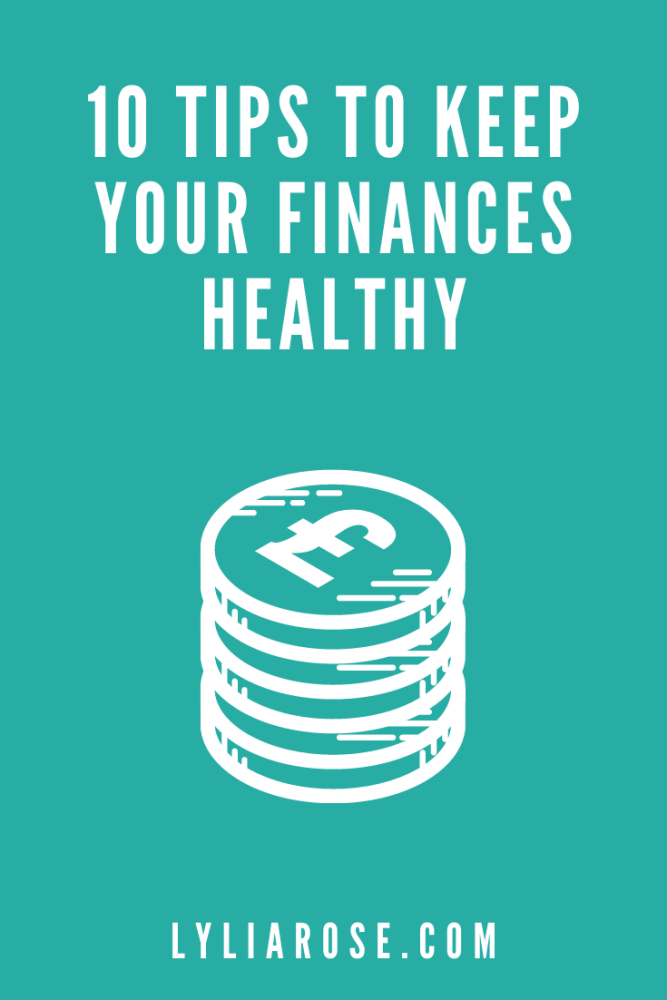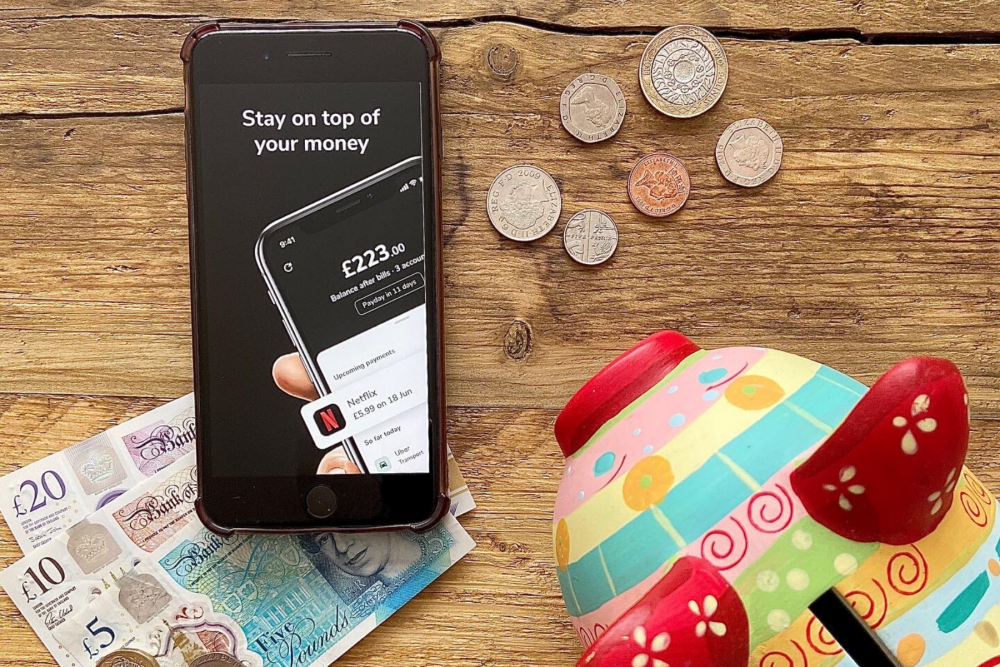10 tips to keep your finances healthy
Posted on
There’s never been a better time to practice better money management than today. As we’re going through a global pandemic right now with financial uncertainty in our personal lives as well as economically, it’s so important to understand our finances and be better with our personal finance.

COVID-19 has shown us just how fragile our economy can be and how financial security is not guaranteed for anyone, in any job. It’s reinforced the importance of regular saving and having a back-up plan when it comes to financial responsibilities.
According to the Independent ‘Coronavirus turns UK into a nation of savers… Pandemic triggers a huge rise in demand for savings plans as household lockdown spending drops by a third’. There has been a huge rise in people seeking savings solutions.
The pandemic has put our individual personal finance situations to the test. If we lost our job tomorrow, how long could we really survive financially?
It’s strengthened the need for emergency funds and savings as a financial backup should the worst happen. And right now, the worst really can happen.
Learning money management skills is vital to survive the financial impact COVID-19 is, or might be, having on you. They are also skills that are so important beyond the current coronavirus situation too.
Read on for 10 tips to keep your finances healthy and on track.
10 money rules to stay on top of your finances

1. Ensure your outgoings are less than your incomings
It sounds obvious, but the best way to manage your money properly is to first ensure you have more coming in than going out.
This is exactly how I had bad money management skills around 17 years ago when I got into a lot of debt. I never worked out my incomings and outgoings. I was foolish and borrowed a lot of money on credit cards and loans to fund a lifestyle I couldn’t afford.
With a car, high mobile phone bill (back when we had to pay for every call and text), rent, bills and several store cards and credit card bills to pay each month, my shop assistant wage at the time was less than my monthly outgoings!
I never budgeted or worked out my finances. I just borrowed money to buy what I wanted without thinking of the consequences.
Needless to say, that didn’t end well.
Nowadays, I work out my incomings and outgoings every single month, to the penny!
I have an Excel spreadsheet and I update it daily as direct debits leave my account or I spend money on groceries.
I know exactly where I am with my money and don’t overspend. I can afford all my outgoings, I put money aside and then I budget what’s left to last until the next payday.
Here are my tips for how to properly manage your salary and budget throughout the month.
2. Only borrow what you can afford to pay back
Most of us need to borrow money at some point in our lives, whether it’s a mortgage to buy a house, finance to purchase a car or a loan for home improvements. You can still practice good money management even if you borrow money and it’s inevitable that most of us will seek to borrow money at some point.
Just make sure you borrow sensibly. Only borrow what you can afford to pay back. Make sure you know exactly how much your repayments will be and the amount of interest you need to pay back.
For short term borrowing, a 0% credit card might be a better option if you can clear the balance during the initial 0% interest period. This is a great way to borrow money without paying any interest, if you manage it properly and pay it back on time.
Otherwise credit card interest can be very high compared to a loan. If you are in the market for a loan then do your research and compare the best loan rates to get the best deal for your own circumstances.
Choosing to get into debt is a big decision and it shouldn’t be taken lightly. Make sure you are borrowing for the right reasons and don’t end up in debt crisis like I did in my late teens due to irresponsible spending habits. That type of debt was totally unnecessary and very foolish of me. Lesson learnt.
We are currently paying back a loan for home improvements and it was the only way to fund doing up an old house we purchased without saving for ten years! It’s an investment into our home and will increase its value, so to us it was worthwhile borrowing. The payments are really affordable and we overpay our loan every month to clear the balance quicker. Borrowing money for the right reasons can be responsible and not all debt is instantly bad!
Just ensure you’re not borrowing money for a lifestyle you can’t afford.
3. Think before you buy
Now, more than ever, people are realising they can live without a lot of the stuff they used to buy. People are realising that health matters, family matters, time matters and experiences matter. Experiencing a pandemic has made many of us reassess what is valuable in life and it’s not necessarily having the latest gadgets!
It’s always been sensible to think before you buy, especially when it’s an expensive purchase. Ask if you really need it? Will it improve your life? Can you afford it?
Never make a large purchase on impulse. Leave it for a few days, at least, and think carefully about whether you really need the item.
Make better spending choices. Spend wisely and mindfully.
4. Save an emergency fund
Saving an emergency fund is always a good idea, no matter what your financial situation. There will always be times when something costly breaks down and needs repairing or replacing, whether that’s a car, vacuum cleaner or white goods like a fridge-freezer.
Having an emergency fund of cash savings that can instantly be accessed whenever needed will prevent any financial stress when something goes wrong.
There’s nothing worse than the car breaking down and not knowing how you’re going to afford to fix it, especially if you rely on it.
An emergency fund is also a great way to cover living costs if you lose your job suddenly or become too ill or injured to work for a long period of time. Saving up a few months’ worth of pay will give you the financial security to cope with whatever life throws at you and enough time to get back on your feet.
Put whatever you can afford to the side each month to build your emergency fund. The amount will be different for everyone, as will your emergency fund total as everyone has different incomes and outgoings.
Here are lots of tips to reach your emergency fund goal faster.
5. Create a savings goal
Getting into the habit of saving is always a great money management tip. Sure, you should save an emergency fund for financial emergencies, but you should also practice saving instead of always looking to credit when you want something a bit more expensive.
Setting a savings goal for a big purchase, reaching it and avoiding debt is such a great feeling!
If the costs of Christmas, for example, are always a burden, then why not set aside an amount each month for the entire year in a Christmas savings fund?
You’ll be so thankful and proud of yourself when you reach December and already have the money set aside to cover the cost of Christmas without eating into that month’s paycheque!
One of the best ways to save is to decide on an amount you can afford to save and want to save each month. You can use the helpful savings goal calculator at Pigly to quickly see how much you need to save each month to reach your savings target.
Then, treat this amount as an outgoing, like a bill. That’s the best way I’ve found to save money, transfer it, on payday, to your savings account and forget about it. Don’t touch it. Pretend it’s a bill and it’s gone forever! Don’t touch it!
Once you get into the habit of saving then you’ll start to enjoy the challenge and watching your savings balance grow. Then you can think about longer term savings goals like opening stocks and shares ISA accounts or LISA accounts for retirement or buying your first home.
Screenshot of savings goal calculator at Pigly
6. Keep your credit score in check
Learn what your credit score is and how to keep it high. Raising your credit score can have a major impact on your life, so you should always strive to raise it and keep it there.
You can view your credit score for free at many credit checking companies like Experian.
If your credit score is high then it shows you are likely to be responsible with money and pay credit back on time. This enables you to be accepted for credit when you need it and be offered some of the best interest rates.
Read my recent blog post for tips on how to improve your credit score and learn exactly what it is.
7. Never miss a payment
Something that can really harm your credit score and chances of future borrowing is missing a debt payment or bill payment. If you are in financial difficulty, you should never just miss a payment. This can go on your record and can affect your credit score for a long time.
Instead, make sure you contact your biller or creditor as soon as possible to discuss your options. If you have a good track record with payments then you may be able to make reduced payments in the short term, arrange a more affordable payment plan or take a payment holiday.
Never just cancel a direct debit for money you owe or skip the payment as it can have terrible consequences.
Many companies are understanding and will help you if you have short term financial difficulties. For longer term financial difficulties they will be able to signpost you to the official organisations who can provide support and advice on the steps you need to take.
8. Overpay debt when you can
Most debts let you overpay. For example, our mortgage allows us to overpay up to 10% of the balance each year without a financial penalty.
We can also overpay our loan and do so each month through quick online transfers from our bank account. We have a payment set up to our loan and overpay as much as possible each month.
Not only does this pay back the debt quicker, but in regards to our loan, it reduces our monthly payments and they give us an interest rebate every time we overpay!
Check the rules for your own personal debt, but if you can overpay then you can drastically reduce the amount of interest you have to pay back.
9. Plan for your future
Living for the now is great in some respects - you should enjoy your youth and have some fun and experiences with your hard earned cash. But, at the same time, you should plan for your future, the unexpected and the worst.
You don’t want to reach retirement and struggle with cash in your senior years. The state pension probably isn’t enough to fund the lifestyle you might desire in your retirement.
Read my blog post why you shouldn’t rely on a state pension to see if you could live on that amount!
Plan for your future
It’s so important to have your own personal pension in place too or a retirement fund. Most employers offer a workplace pension and they may top up the amount you save each month, boosting your pension pot at no extra cost to you.
If you’re self-employed then a pension might not be the most appealing option. Instead, take a look at the Moneybox Cash Lifetime ISA which offers a 25% bonus on savings of up to £4000 per year. That’s a maximum of £1000 free cash, per year, added to your retirement savings!
Whilst retirement might seem a long way off, it’s important to understand how much you want to live off once retired, the age you plan to retire and how you are going to fund this lifestyle. The earlier you start saving, the better. The longer you put it off then the more you will need to save in your later working years.
Plan for the unexpected
It’s also important to have plans in place should the worst happen. No-one likes to think about death, but it’s a guarantee in life and none of us know when it will happen. If you rely on your other half to pay towards a mortgage or your family lifestyle, then life insurance can offer the security you need should anything happen to them, or you.
You should make room in your budget for insurance costs such as life insurance, especially when you buy a house with your partner. This will ensure you are not in financial difficulty if one of you dies. You can take out life insurance to cover the balance of the outstanding mortgage and extra, which can be especially important if you have dependants.
Plan for the worst
On the same note, it’s also important to make a will. If you want your money, property and possessions to go to the person of your choice, then it’s a topic you need to talk about and put into writing. In order to pass your estate on to those of your choosing, it is really important you make a will. It can prevent family conflict on your passing and ensure your dependants are left an inheritance.
Whilst the future and your passing, or your loved ones passing, might not be something you like to think about, it’s important to spend some time considering your options and putting things in place. Once you have a pension or retirement pot then you simply save into it each month and can forget about it. The same with life insurance - find a suitable plan and set up a direct debit every month, then you can get on with your life with some extra peace of mind.
Writing a will doesn’t have to be complicated either. You can write a will in person with the assistance of a specialised solicitor, or you can make use of online will writing services. Kwil, for example, offer the simplest way to write your will. From a fixed price of just £90 you can write a will in as little as 20 minutes and have it checked by their will experts.
10. Assess your spending habits
Know where your money goes. There are numerous free apps that can help with money management such as Money Dashboard or Yolt. These apps can safely link to your bank accounts and automatically categorise your spending so you can see exactly where your cash goes, whether that’s too many coffees, drinks at the bar or funding a clothes shopping addiction!
Don’t just spend willy-nilly. By assessing your spending habits and knowing exactly where you spend your money, you can then decide where to make cutbacks to improve your own personal finance situation.
Why not increase your incomings?
You can also consider other ways you can boost your incoming. Fortunately, numerous opportunities require little or no effort to increase your income. For instance, you can create digital products to sell passively to add to your 9-5 income. This may include selling online courses, stock photography, eBooks, and so on. You can also utilise social media advertising to boost your passive income.
Find loads of ways to make extra money at home on my blog, as well as my favourite side hustle in my matched betting blog!
To get started, here are 60 ways to make money at home that I’ve tried and tested.
Follow these steps to make £1000 in one month at home. Or, if you’re short on time, try these methods to make money in one hour.
Final thoughts
Being better with money doesn’t have to be complicated. A lot of this is basic money management knowledge, some are things you need to organise and others are habits you should develop. Being better with money is a choice and it’s a wise choice to make!
My blog is packed with money saving tips and advice to help you better manage your finances. If you need more cash then I share tried and tested methods to make money from the comfort of your own home! Check out all the ways I’ve managed to make money at home in my blog post 60 ways to make money online + at home.

